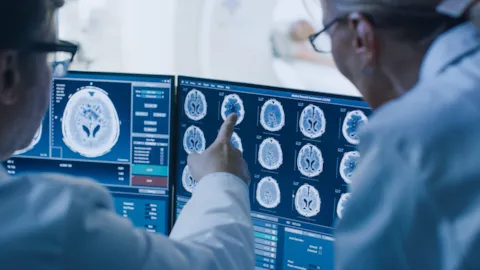Acute Stroke Ready (ASR) Certification
DNV’s ASR Certification supports hospitals in providing time-critical stroke care, ensuring alignment with evidence-based standards for rapid assessment and treatment.
Acute Stroke Ready (ASR) Certification
Challenges in ASR Certification for healthcare providers
Rapid diagnosis and treatment of acute stroke can mean the difference between recovery and long-term disability – or even life and death. Community hospitals and rural care centres often serve as the first point of contact for stroke patients, making readiness for immediate intervention essential.
These facilities play a critical role in a region’s broader system of stroke care. Ensuring that they are equipped to evaluate, stabilize, and begin treatment as quickly as possible helps reduce transfer delays and improve patient outcomes. Acute Stroke Ready (ASR) Certification supports these hospitals in meeting recognized national standards for stroke care.
How our ASR Certification services support you
DNV’s ASR Certification is designed for hospitals, usually smaller or rural facilities, that provide the initial, time-sensitive triage and stabilization of acute stroke, often before transferring to a larger facility. It verifies that the hospital has the necessary infrastructure, staffing, protocols, and EMS coordination to deliver reliable and standardized emergency stroke treatment.
ASR-certified hospitals can administer intravenous thrombolytic therapy (such as tissue plasminogen activator, or tPA/alteplase) and are equipped to diagnose, stabilize, and perform initial treatment before transferring patients to a primary or comprehensive stroke centre for advanced care.
While these facilities have fewer capabilities than a Primary Stroke Centre, the ASR certification ensures they are fully prepared to manage the critical first phase of stroke care, laying the groundwork for better outcomes.
Elevating stroke care standards
Discover how DNV's stroke certifications help hospitals strengthen helps hospitals strengthen their response systems, enhance coordination, and deliver faster, evidence-based care for every patient.

Trusted experts in healthcare
DNV’s certification blends best practice standards with real-world operational insights. As a global certification and accreditation body, we focus on continuous quality improvement, not just compliance.
Our model is built on ISO 9001 and NIAHO® principles, offering a sustainable and scalable approach to certification.

Benefits of our ASR Certification services
- Increased trust from EMS and referral partners.
- Faster diagnosis and treatment initiation.
- Stronger compliance with CMS and state stroke requirements.
- Foundation for future advancement to higher certification levels.
- Continuous survey readiness and confidence that your program is operating at peak quality year-round.
Explore resources to support your stroke certification
Access essential materials to help guide your certification journey - from program standards to readiness tools.

Integrated Stroke Certification Program requirements
Download the requirements for stroke programs to align with DNV's tiered certification framework

Stroke programs service line brochure
Learn how DNV's stroke certifications elevate quality, performance, and patient outcomes across all levels of care.




